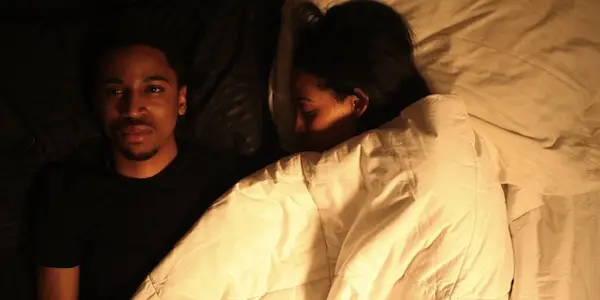In an effort to make the most of my membership to Seed&Spark, I decided to watch one film per day for the next twenty days. I will definitely be reviewing some of these films, to get the word out about these incredible works created by dedicated filmmakers across the country.
Ying & Yang, a 12-minute short directed by Kevin Walker, opens with a shot of our main character, Devin (Derrick L. Middleton), lying in bed. In voiceover, we hear him reading free verse poetry. Already, we see a push and pull within him – he gets out of bed, goes to the kitchen, tries to sit and write. We keep cutting back to a shot of him at the refrigerator, staring blankly.
I had no idea the whole film would be an exercise in poetry; beautifully written words carry us through a dangerous love triangle and expose the inner turmoil of a young, queer black man as he comes to face reality. He must first come to terms with his own feelings, initially surfing through the denial and wishing to be “normal.” But as the film progresses, we get to see his emotions come full circle.
Masculinity and Body Type
One thing I noticed right off the bat, even though it likely has little to do with the narrative itself, was Tyrone (Calvin M. Thompson) and Devin’s two very distinct body types. The juxtaposition of their physicality is reminiscent of Abigail Solomon-Godeau’s discussion of the warrior versus the ephebe body type (as excerpted from Boys, Boyz, Bois: An Ethics of Black Masculinity in Film and Popular Media by Keith M. Harris).

“Ideal masculinity” is revealed through the appearance of the “warrior” (in this case, Tyrone) while his scrawny-ish counterpart (Devin) teeters on the other end of the spectrum. Of course, add in grey sexuality to the mix, and you’ve get a whole new kind of c*cktail.
In his discussion of the film 100 Rifles, Harris describes the two main characters’ appearances as, “The muscular, brute, athletic body was counter to the slim, clothed, middle-class body as the sexual to the asexual (or at most implied sexual)” (Harris 67). Interestingly, in Ying & Yang, Devin is not sexualized until he is intimate with Tyrone. But Tyrone is sexual from the get-go; when his character is introduced, we cut to shots of his mouth and his muscular arms. Devin’s girlfriend is immediately sexualized as well, with similar tools used to accentuate her features.
By training the camera’s eye on Tyrone’s body, we are led to believe that Tyrone is a sexual object. He is the warrior, the athlete, the epitome of masculinity. But the line between masculinity and femininity, and obviously the lines between gay and straight, are blurred when Tyrone makes the first move on Devin.
I find it intriguing that the stereotypically (a.k.a. physically) masculine character makes the first move, but according to Harris‘ theory, it should come as no surprise that the warrior character is primarily sexual. He is the perfect yang: strong, sweet, sexy. Idolized by Devin, Ty keeps the film alive.
“We both are men. Black men at that. To be in love with each other: the ultimate revolutionary act.”
Yes, Tyrone and Devin’s love affair is revolutionary. But is it believable? I’m not so sure. Frankly, when Tyrone kissed Devin for the first time, I was a little shocked. Was it really that easy?
Maybe the point here is that sexuality can flip on a dime, as can impulses and desires. On the other hand, though, it feels like the director suspends reasonable belief in order to satisfy the audience. I mean, Tyrone and Devin are dating two women who happen to be sisters; both are in relatively serious relationships at the time of the guys’ first kiss. The whole move seems teenager-like, but then again, first true love can have that effect.
Ying & Yang broaches the topic of black masculinity. Devin battles with his own shortcomings; he can’t please his woman but he still loves her. He has feelings for his best friend but fears they are unrequited. The question remains: where does he stand as a man, a lover, a friend? Can he define himself or will he cave in to social pressures? As a character who has been marginalized by our own culture, Devin, in a sense, falls victim to the cycle of oppression. It is sad to see Devin retain a sense of authenticity only in secret. But I won’t spoil anything more.
Ying & Yang: After Thoughts
I am so glad that I found Ying & Yang. The poetry alone is worth a listen, and the visuals that go along with the words are equal parts entrancing and delightful. Of course, the film’s subject matter is no walk in the park; black masculinity and flex sexuality can be a dizzying maze, but the director handles these truths with grace and ease. We are given a window into the messed up mind of a man deciding his own fate. The result is empowering and heartbreaking, and I wanted to see more.
Ying & Yang is available on Seed&Spark.
Does content like this matter to you?
Become a Member and support film journalism. Unlock access to all of Film Inquiry`s great articles. Join a community of like-minded readers who are passionate about cinema - get access to our private members Network, give back to independent filmmakers, and more.